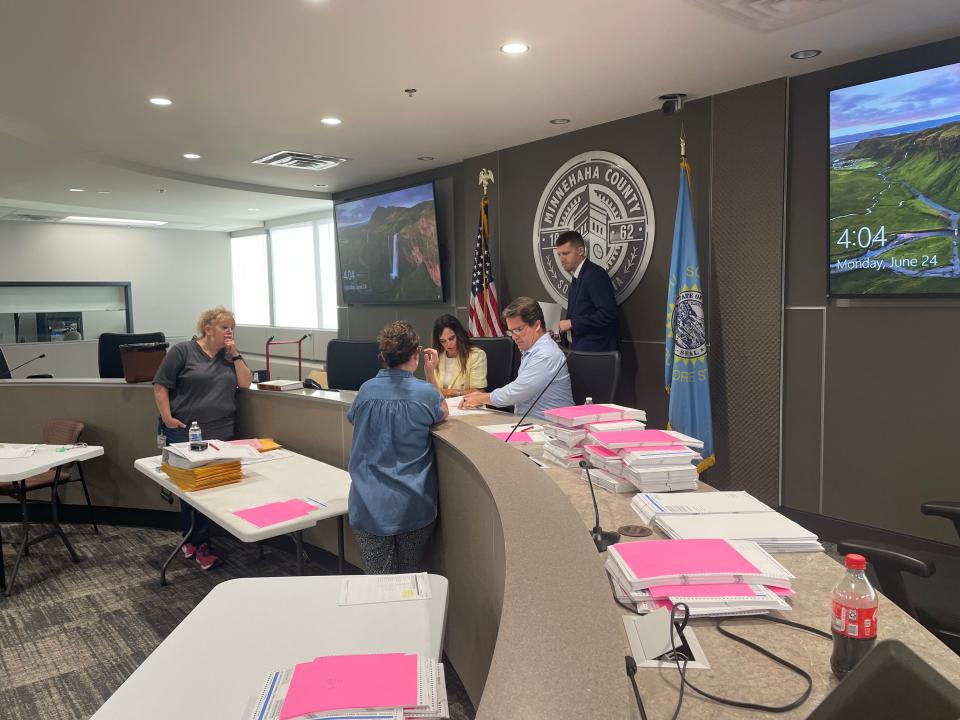Election integrity group asks SD Supreme Court for action on Minnehaha June primary
- Oops!Something went wrong.Please try again later.
The president of a South Dakota-based election integrity group, and a District 11 candidate who was narrowly defeated in a June primary election, are asking the South Dakota Supreme Court to compel a number of state and local officials to take a number of actions regarding the state's elections — including invalidating 132 votes that have already been the subject of controversy.

In a filing dated July 8, petitioners Jessica Pollema and John Kunnari claim that respondents to their petition "engaged in insufficient efforts to ensure that the legal registered voters voted in this election," and that they have "allowed, and continue to allow, violations of federal election laws, state election laws, the United States Constitution, and federal civil rights laws pertaining to voter rights."
Those respondents include Secretary of State Monae Johnson, Minnehaha County State's Attorney Daniel Haggar and Minnehaha County Auditor Leah Anderson, as well as the county's Deputy State's Attorney Eric Bogue and the five members of the county's Canvassing Board.
More: Secretary of State's Office: Challenge to Minnehaha County ballots fell outside state law
Much of the filing's complaint centers around a challenge that Pollema, the president of the South Dakota Canvassing Group, made regarding absentee ballots at two of the county's voting precincts during the June 4 primary, which resulted in 132 absentee ballots being rejected.
Pollema told the Argus Leader on June 4 that she was challenging the ballots based on voter registration forms that she said showed shared addresses at Sioux Falls post office boxes, a common practice in South Dakota where people who travel the country all or part of the year can spend a night in the state, establish it as their legal residence and have their mail forwarded to them.
Pollema has argued that such voters are not legally residents of the state, but both SOS officials as well as Haggar and Bogue have told the Argus Leader that they believe Pollema's challenge fell outside of state law, which says that challenges can only be made "as to the person's identity as the person registered whom the person claims to be or on grounds that within 15 days preceding the election the person has been convicted of a felony or declared by proper authority to be mentally incompetent."
More: Recount board opts to count 132 absentee ballots originally rejected in June 4 primary
The 132 votes were eventually included in the official county by a recount board that examined three races on June 24, including the District 11 primary lost by Kunnari.
Among the actions that Pollema and Kunnari want the court to require are that Anderson "revert to the unofficial vote count totals completed on June 4, 2024 without the 132 fraudulent ballots included in the vote totals for Minnehaha County precinct 04-16," as well as conduct a "thorough review" of voters in precincts 04-16 and 05-16.
The filing also calls for Johnson's office to provide evidence that the state's voter registration files have been audited, as well as an explanation for what it refers to as "illogical, uncompliant, and impossible voter data recorded in the statewide voter file."
While Johnson and the South Dakota Canvassing Group have long been at odds for what the group sees as insufficient concern about their claims regarding voter integrity, the group is a strong supporter of Anderson and her actions as county auditor.
Anderson said she would have a statement sometime Friday, and said that the State’s Attorney’s office had turned the issue over to outside counsel.
“I can say there are some very valid points regarding residency laws that I have been trying to uphold since I took office,” Anderson added. “This is mostly regarding persons who claim ‘residency’ but do not live in our state. We do need better laws and we need more people to uphold the laws that are currently in place.”
This article originally appeared on Sioux Falls Argus Leader: South Dakota Supreme Court asked to weigh in on June primary concerns

